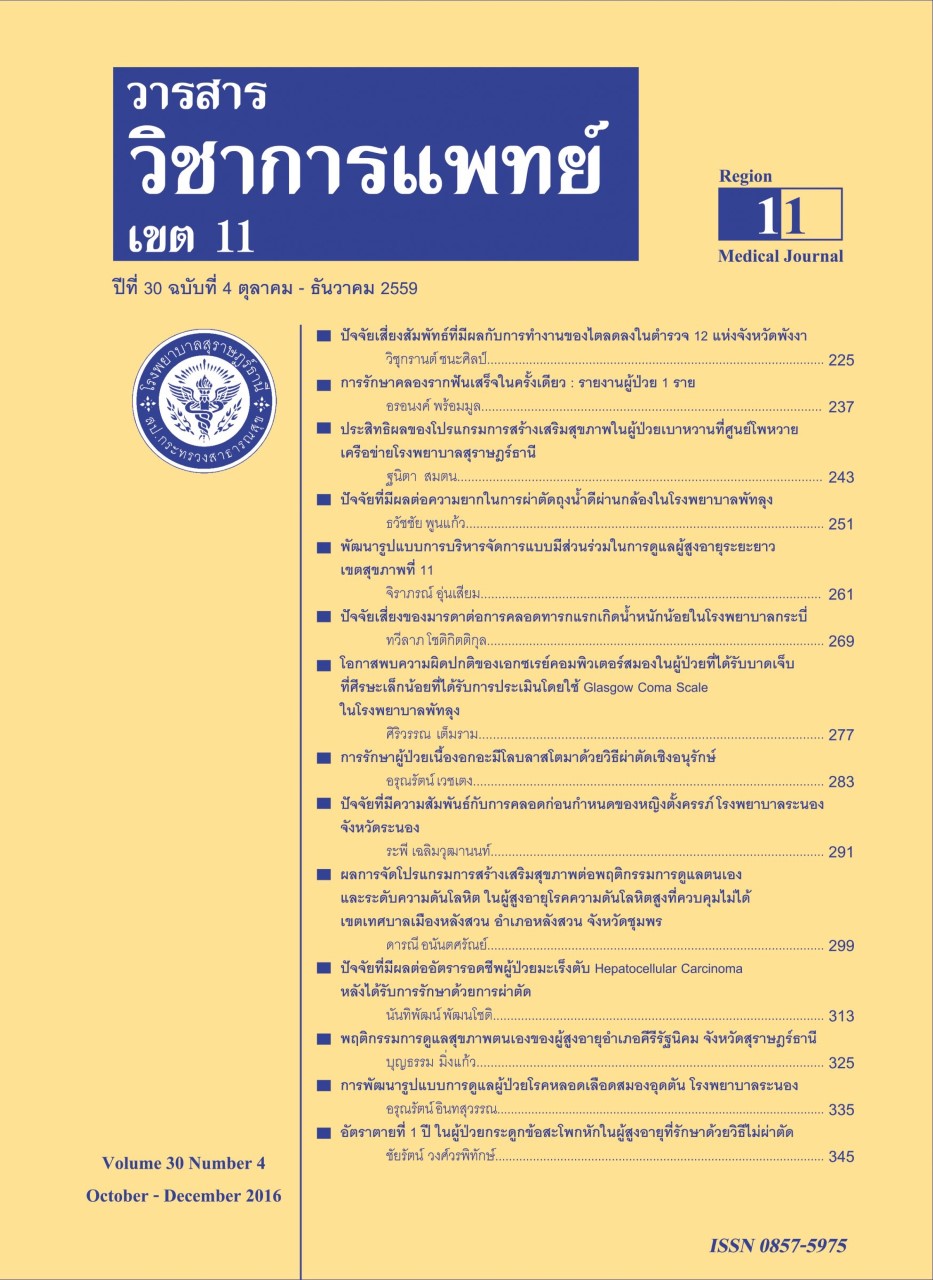Effects of health care promoting program on self-care behavior and blood pressure level among older adults with uncontrolled hypertension in Langsuan municipality,Chumporn province
Keywords:
Self-care Behavior Promoting Program, self-care behavior, uncontrolled hypertensionAbstract
This experimental research was conducted to evaluate Self-care Behavior Promoting Program on self-care behavior and blood pressure level among community-dwelling older adults with uncontrolled hypertension.A total of 60 subjects,and 60-79 years old with blood pressure over 140/90 in hypertension without DM subjects, over 130/80 in hypertension with DM subjects within pasts 6 months,who met inclusion criteria and lived in the two communities in Langsuan municipality,were randomly assigned to be in an experimental (n=30) and a comparison groups (n=30).The experimental group received a 10-weeks Self-care Behavior Promoting Program.The research processes were composed of blood pressure assessment,health education, and skill training
regarding hypertension, self management,complication prevention, home visit and weekly telephone follow up 2 times. The comparison group received regular services from the same primary health care center. Data were collected by the researcher using questionaires before and after intervention. The content validity and reliability of the questionnaire were tested, the alpha-coefficient was 0.75.
According to t-test analysis,after the intervention,the experimental group had significantly higher mean scores of knowledge on hypertension, perceived susceptibility, perceived severity, and self care than before the intervention, and those in the comparison group(p-vale<0.01).The mean scores of perceived benefits, the experimental group had not significantly higher than before the intervention(p-value>0.01), and the comparison group (p-value 0.127) Also the level of blood pressure after intervention,the experimental group had systolic blood pressure and diastolic blood pressure significantly lower than before the intervention( p -value < 0.01) and those in the comparison group ( p -value < 0.01)
The suggestions from this research is that the health care personnel should apply this program to promote self care among older adults with uncontrolled hypertension and other chronic diseases in other communities.
References
2. กระทรวงสาธารณสุข กรมสนับสนุนบริการสุขภาพ. (2547) แบบสอบถามการเฝ้าระวังพฤติกรรมสุขภาพ เรื่องโรคความดันโลหิตสูง. กรุงเทพมหานคร: กรมสนับสนุนบริการสุขภาพ กระทรวงสาธารณสุข.
3. จารุณี ปลายยอด,อรสา พันธ์ภักดี และชีวรัตน์ ต่ายเกิด.(2555) ผลของโปรแกรมการส่งเสริมการมีส่วนร่วมในการดูแลตนเองต่อการรับร้คู วามสามารถในการดูแลตนเอง น้ำหนักตัวและการควบคุมความดันโลหิตของผู้ที่เป็นโรคความดันโลหิตสูง. รามาธิบดีวารสาร,18(2),223-235.
4. ทัศนีย์ เกริกกุลธร. (2545) ผลของโปรแกรมส่งเสริมการดูแลตนเองต่อความรู้การปฏิบัติกิจกรรมการดูแลตนเอง และการส่งเสริมการดูแลตนเองของผู้สูงอายุที่มีความดันโลหิต. วิทยานิพนธ์ พย.ด.กรุงเทพมหานคร : บัณฑิตวิทยาลัย มหาวิทยาลัยมหิดล.
5. นพรัตน์ เจริญกิจ. (2549) รายงานการวิจัยเรื่องประสิทธิผลของโปรแกรมส่งเสริมการดูแลตนเองในกลุ่มเสี่ยงของโรคความดันโลหิตสูงในโรงพยาบาลบ้านโป่ง. ราชบุรี : โรงพยาบาลบ้านโป่ง.
6. ประชัน จันทร์สุข. และคณะ. (2548) รายงานการวิจัยเรื่อง ประสิทธิผลของการใช้กระบวนการกลุ่มช่วยเหลือตนเองต่อพฤติกรรมการดูแลตนเองและคุณภาพชีวิตของผู้ป่วยมะเร็งเต้านม. ชัยนาท :วิทยาลัยพยาบาลบรมราชชนนี ชัยนาท.
7. ประสบสุข ศรีแสนปาง และคณะ. (2546) “ประสิทธิผลของโปรแกรมส่งเสริมการดูแลตนเองต่อพฤติกรรมการดูแลตนเองของผู้ป่วยความดันโลหิตสูงในโรงพยาบาลศูนย์ขอนแก่น” วารสารสภา
พยาบาล. 28 (18) หน้า 58-62.
8. รุ้งราวรรณ พันธจักร. (2548) ผลการจัดโปรแกรมสุขศึกษาที่มีต่อความรู้ การรับรู้ และพฤติกรรมการดูแลตนเองของผู้ป่วยโรคความดันโลหิตสูงที่มารับการรักษาที่โรงพยาบาลพยุหะคีรี.
วิทยานิพนธ์ ค.ม (สาขาการส่งเสริมสุขภาพ) นครสวรรค์: บัณฑิตวิทยาลัย มหาวิทยาลัยราชภัฏนครสวรรค์.
9. วิภา แก้วเคน. (2545) ผลของโปรแกรมการให้ความรู้ด้วยกระบวนการกลุ่มต่อพฤติกรรมการดูแลตนเองของผู้ป่วยโรคข้อเข่าเสื่อม. วิทยานิพนธ์พย.ม. (สาขาการพยาบาลผู้ใหญ่) ขอนแก่น : บัณฑิตวิทยาลัย มหาวิทยาลัยขอนแก่น.
10. วิมลนิจ สิงหะ. (2548) รายงานการวิจัยเรื่อง ผลของโปรแกรมการสร้างพลังต่อการรับรู้ความสามารถแห่งตน และระดับความดันโลหิตของผู้ที่มีความดันโลหิตสูงเกินระดับปกติในชุมชน. สระบุรี:วิทยาลัยพยาบาลบรมราชนนี สระบุรี.
11. สมพร ตังควนิช และคณะ. (2549) รายงานการวิจัยเรื่อง ปัจจัยที่ส่งผลต่อการควบคุมความดันโลหิตของผู้ป่วยความดันโลหิตสูงระดับรุนแรงตำบลสันมหาพน อำเภอแม่แตง จังหวัดเชียงใหม่ :ศูนย์สุขภาพชุมชนสันมหาพน.
12. สุภัททา อินทศักดิ์. (2551) รูปแบบการบริการสุขภาพในการดูแลตนเองของผู้ป่วยความดันโลหิตสูงตำบลนางบวช อำเภอเดิมบางนางบวช จังหวัดสุพรรบุรี. วิทยานิพนธ์ วท.ม. (สาธารณสุขชุมชน) มหาสารคาม : บัณฑิตวิทยาลัย มหาวิทยาลัยมหาสารคาม.
13. สำนักนโยบายและยุทธศาสตร์ กระทรวงสาธารณสุข (2558).จำนวนและอัตราผู้ป่วย/ตายด้วโรคความดันโลหิตสูง ปี2550-2557 สืบค้นเมื่อ10 มิถุนายน 2559
http://www.thaincd.com/document/file/download/paper-manual/Annual-report-2015.pdf
14. Apple, L. J. et al. (2003) “Effects of Comprehensive Lifestyle Modification on Blood Pressure Control : Main Results of the PREMIER Chinical Trial”
Journal of American Medical Association. Page 289, 2083-93.
15. Boonchun N.,et al.(2011) Effect of an Empowerment Program on Self- care Agency foe Elders with Hypertension.Journal of Nursing Science, 29(2).93-102.
16. Gilbert P. A. and Heiser, G. (2005) “Salt and health : the CASH and BPA perspective” British Nutrition Foundation Nutrition Bulletin. 30 Page 62-69.
17. Orem, D. E. (1995) Nursing Concepts of Practice. 5th ed. St.Louis : Mosby. U.S. Department of Health and Human Services. (December 2003) The Seventh Report of the Joint National Committee on Prevention, Detection, Evaluation, and Treatment of High Blood Pressure (JNC vii). Washington, D.C. : U.S. Depatement of Health and
Human Services.






